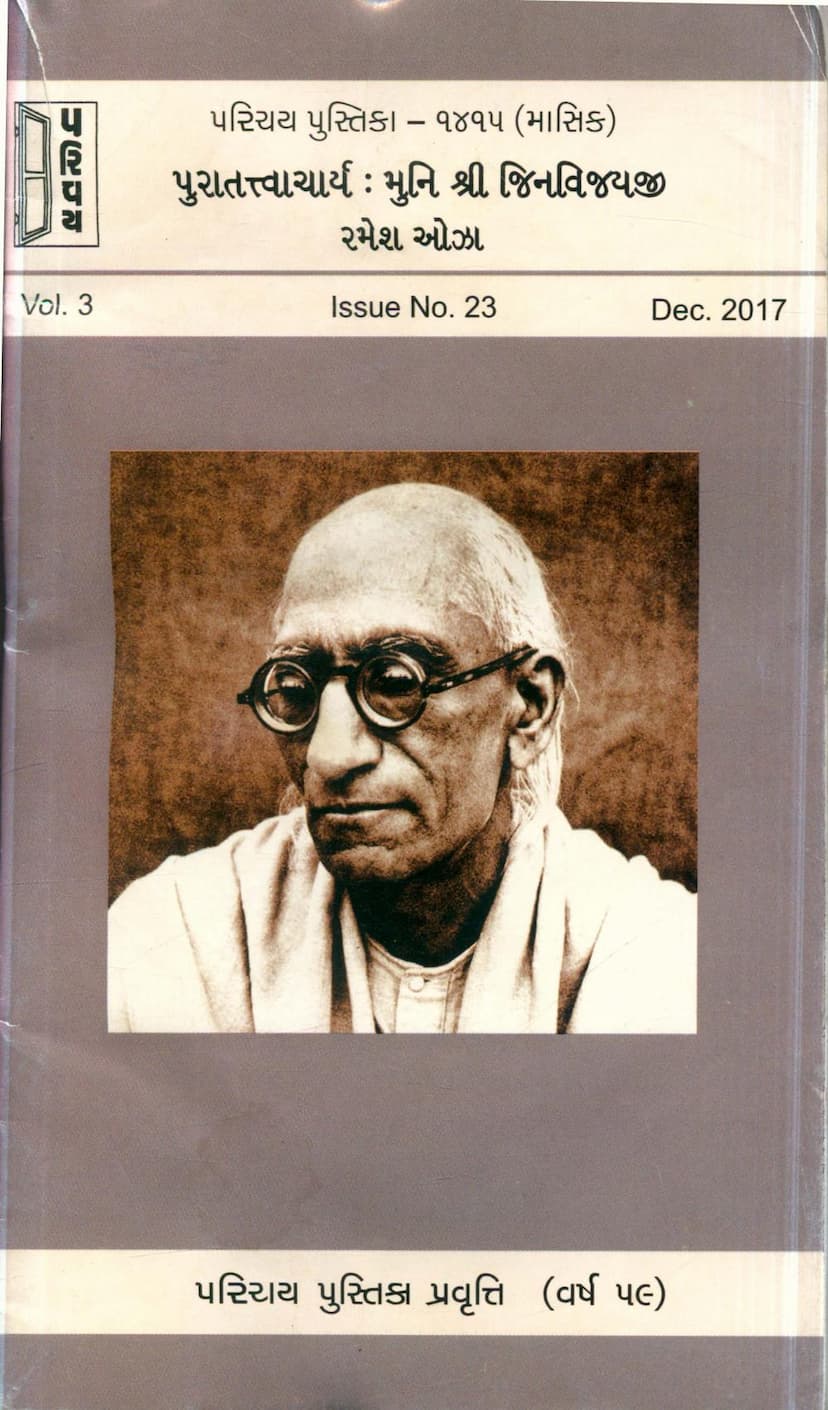Puratattvacharya Muni Shree Jinvijayji
Added to library: September 2, 2025

Summary
Here's a comprehensive summary of the provided Jain text, "Puratattvacharya Muni Shree Jinvijayji" by Ramesh Oza, focusing on the life and contributions of Muni Shree Jinvijayji:
This book, published by Parichay Pustika Pravrutti, is a biographical account of Puratattvacharya Muni Shree Jinvijayji (January 27, 1888 - June 3, 1976), written by Ramesh Oza. The publication is part of the "Parichay Pustika" series, a monthly publication aimed at disseminating knowledge across various subjects.
Early Life and Spiritual Calling:
- Muni Shree Jinvijayji was born Kishan Singh (or Ranmal, affectionately called Rinmal by his mother) in the village of Rupayeli, Rajasthan. His father was Biradhisinhji, a Parmar Rajput, and his mother was Rajkunwari, from a Chauhan lineage.
- His childhood was marked by significant events, including his father's involvement in the 1857 revolt and subsequent period of hiding.
- At the young age of fifteen, he took Jain monastic vows within the Shvetambara Murtipujak sect, adopting the name Kishanlal, and later becoming known as Muni Jinvijay. This marked a significant shift from his Rajput heritage and princely upbringing.
- His spiritual journey was influenced by his guru, Yati Devhansji, a skilled physician and astrologer. He also received guidance and education from other Jain scholars.
Scholarly Pursuits and Archaeological Contributions:
- Muni Shree Jinvijayji was a profound scholar and a pioneer in Jain manuscriptology and archaeological research.
- He was instrumental in the establishment and development of the Gujarat Puratattva Mandir (Gujarat Institute of Archaeology) at Gujarat Vidyapith, founded by Mahatma Gandhi. He also named this institute.
- His work involved the meticulous collection, study, and publication of ancient Jain manuscripts, contributing significantly to the preservation and understanding of Jain literature and history. He authored and edited numerous significant works, contributing to various series and journals.
- He had a deep connection with the Bhandarkar Oriental Research Institute in Pune, where he studied rare manuscripts and interacted with prominent scholars of his time, including Lokmanya Tilak and Dr. Pandurang Gune.
- His scholarly contributions gained international recognition, leading to invitations to Germany and interaction with prominent Indologists.
Connection with Mahatma Gandhi and National Movement:
- Muni Shree Jinvijayji was deeply inspired by the nationalistic fervor and the work of Mahatma Gandhi.
- He joined Mahatma Gandhi's Non-Cooperation Movement, and his shift from a monastic life to active participation in national service marked a new phase in his life. He embraced the ideals of national education and became involved in the establishment of Gujarat Vidyapith.
- He actively participated in the Salt Satyagraha (Dandi March) and was imprisoned for his activities.
Later Life and Legacy:
- Later in life, he renounced his monastic attire and became a dedicated national servant.
- He established the Rajasthan Prachyavidya Pratishthan (Rajasthan Institute of Oriental Studies) and the Sarvodaya Sadhana Ashram in Chanderiya, Rajasthan, focusing on rural development, self-reliance, and the promotion of Indian culture and heritage.
- He was honored with the Padma Shri award by the Indian government in 1961 for his immense contributions to Indian studies and archaeology.
- Muni Shree Jinvijayji passed away at the age of 88 in Ahmedabad. His life was characterized by a relentless pursuit of knowledge, a deep commitment to spiritual and national service, and a pioneering spirit in the field of Jain scholarship and archaeology.
The book highlights his journey from a royal background to monasticism, his scholarly achievements in deciphering and publishing ancient Jain texts, his engagement with the Indian national movement, and his later philanthropic and educational initiatives. It provides a comprehensive account of a multifaceted personality who dedicated his life to the advancement of knowledge and service to humanity. The extensive list of his published works at the end of the book underscores the vastness of his scholarly contributions.